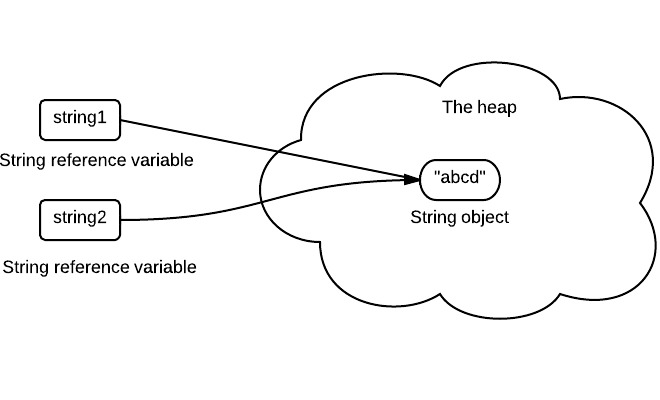Why Are Strings Immutable in Java? Finest Practices and Use Cases
Why Are Strings Immutable in Java? Finest Practices and Use Cases
Blog Article
What Is Immutable Strings and Exactly How It Functions
In the world of shows, comprehending the idea of immutable strings is critical for producing robust and safe and secure applications. Immutable strings describe strings that can not be changed after they are produced, guaranteeing data integrity and predictability within the code. This essential principle plays a crucial function in various programs languages and offers a special technique to handling data. By discovering the details of exactly how immutable strings function, one can reveal a world of benefits and opportunities that can elevate the top quality and performance of software application growth.
The Essentials of Immutable Strings
Immutable strings, as a fundamental concept in programming, are character sequences that can not be changed as soon as they are developed. This implies that when a string is assigned a worth, that value can not be modified. In languages like Python and Java, strings are immutable items, bring about various effects in terms of memory monitoring and data honesty.
One of the crucial benefits of immutable strings is that they supply a feeling of security in data manipulation. Given that the content of an unalterable string can not be changed, it ensures that the original information remains intact, lowering the threat of unintended modifications during program execution (Why are strings immutable in Java?). This residential property likewise streamlines debugging processes, as programmers can rely on that once a string is specified, its worth will certainly not be accidentally changed
When a brand-new string is created based on an existing one, rather than changing the initial string, the brand-new worth is saved independently. Generally, comprehending the essentials of immutable strings is essential for mastering programs concepts and optimizing code performance.
Advantages of Immutable Strings
Building upon the safety and performance advantages of immutable strings, their advantages expand to enhancing code reliability and simplifying concurrent programs tasks. By being unalterable, strings can not be customized after creation, which removes the risk of unplanned changes in the information they save. This integral immutability makes sure that when a string is created, its value stays continuous throughout the program's execution, decreasing the possibilities of insects created by unforeseen modifications.
Additionally, immutable strings add to code reliability by making it easier to reason regarding the state of a program. Since strings can not be transformed, designers can rely on that a string will always hold the same value, streamlining debugging and upkeep efforts. This predictability leads to a lot more reputable and steady codebases.

Implementation in Shows Languages
Within various programming languages, the unification of immutable strings is an essential element that impacts exactly how information is managed and link adjusted within code frameworks. The application of immutable strings differs across various programming languages, with each language supplying its very own mechanisms to sustain this idea.
In comparison, languages like C and C++ do not have integrated assistance for unalterable strings. Designers in these languages need to by hand execute immutability by enforcing regulations within their code to stop direct adjustments to string items.
Best Practices for Working With Immutable Strings
When dealing with unalterable strings in programming languages like Java and Python, adhering to finest methods makes certain effective and safe and secure data control. Among the crucial ideal practices is to use StringBuilder or StringBuffer as opposed to directly adjusting strings, specifically when dealing with comprehensive concatenation operations. These classes give mutable alternatives for string manipulation, helping to avoid unnecessary memory allotments and enhancing performance.
In addition, when working with delicate data such as passwords or API secrets, it is essential to prevent storing them as simple message in unalterable strings. Making use Click This Link of safe storage systems like char varieties or specialized collections for managing sensitive info helps minimize protection threats linked with immutable strings.
Real-world Applications and Examples
Discovering functional applications of unalterable strings in numerous markets exposes their considerable influence on information integrity and system reliability. In the health care sector, immutable strings play a crucial function in ensuring the security and privacy of patient information. By stopping unauthorized adjustments to delicate details such as medical records and prescriptions, unalterable strings help maintain conformity with stringent personal privacy policies like HIPAA.
Financial establishments additionally take advantage of the unalterable nature of strings to improve the security of consumer data and purchase Clicking Here documents. Immutable strings help stop fraud and unauthorized modifications to economic information, giving a durable defense against cyber risks and guaranteeing the count on and confidence of clients.

Conclusion
Finally, unalterable strings are dealt with and unchangeable series of personalities that offer advantages such as thread security and boosted efficiency in shows. They are applied in various shows languages to make sure data honesty and protection. Ideal techniques for collaborating with unalterable strings include avoiding straight modifications and using techniques that return brand-new string things. Real-world applications of immutable strings consist of data encryption, caching, and string manipulation jobs.
Unalterable strings refer to strings that can not be altered after they are developed, guaranteeing information stability and predictability within the code. When a brand-new string is created based on an existing one, rather than modifying the original string, the new worth is saved independently.In languages like Java and Python, strings are unalterable by default, implying that as soon as a string things is developed, its worth can not be altered - Why are strings immutable in Java?. Best methods for functioning with unalterable strings consist of preventing straight adjustments and using methods that return brand-new string items. Real-world applications of immutable strings include information file encryption, caching, and string control tasks
Report this page